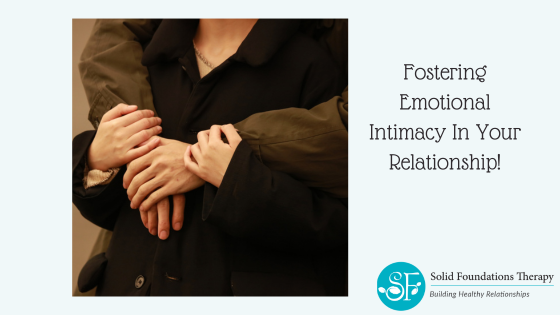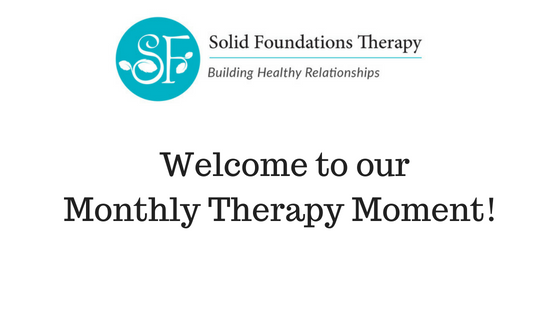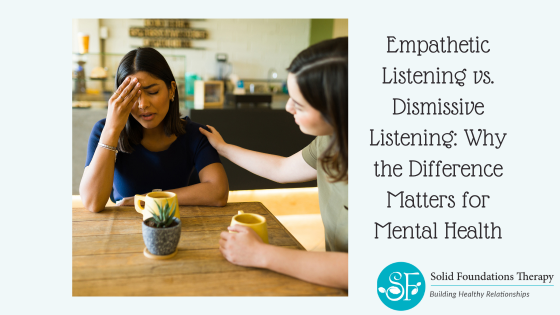Fostering Emotional Intimacy In Your Relationship
Let’s start with a little normalization: most couples who sit on my couch (or screen) are not there because they don’t love each other. They’re there because something feels off. The conversations feel shallower. The laughter comes less easily. The sense of being truly known by your partner feels… fuzzy.
That fuzzy feeling often comes down to emotional intimacy…
Navigating Cultural Differences in Relationships with Confidence!
Relationships are beautiful, but they can also bring unique challenges when you and your partner come from different cultural backgrounds. Embracing those differences with curiosity and respect can strengthen your bond and open new doors of understanding.
Empathetic Listening vs. Dismissive Listening: Why the Difference Matters for Mental Health
When someone we care about is hurting, our instinct is often to do something — offer solutions, cheer them up, or try to help them “move past” what’s wrong. While these intentions usually come from a place of love, they can sometimes backfire. The way we listen can either deepen connection and emotional safety, or it can unintentionally make someone feel unheard and alone.
Two common styles of responding — empathetic listening and dismissive listening
Navigating Neurodivergence in Romantic Relationships: Embracing Differences with Compassion
In my work as a couples therapist, I’ve had the privilege of walking alongside a variety of partners as they navigate the intricacies of love, commitment, and communication. For couples where neurodivergence plays a role—whether through ADHD, autism, or other neurological variations—the journey often can include unique challenges, but also incredible strengths. With patience, openness, and understanding, couples can build deeply fulfilling relationships that honor both individuality and connection.
Understanding Neurodivergence vs. Personality Differences
Getting to the Heart of Anger in Relationships!
Let’s be honest—anger is one of those emotions that shows up often, especially in romantic relationships. Maybe it pops up during an argument, or when you feel hurt, ignored, or disrespected. But here’s the thing: anger is rarely the full story. More often than not, it’s covering up something deeper—like sadness, fear, frustration, or insecurity.
When we start to understand what’s really going on beneath the anger, it becomes easier to talk about what we’re feeling and avoid the blowups that can push us further apart. One really helpful tool for doing this is the use of “I feel” statements—also called a “gentle startup,” a concept from relationship experts John and Julie Gottman. This simple approach helps turn conflict into connection.
Trigger vs. Root: What’s Really Causing Your Relationship Conflict? (video)
Ever felt blindsided by how intense an argument got—like something deeper was going on?
You're not crazy. You're likely reacting to a root wound, not just the trigger in front of you.
By identifying the root issue with your partner, better communication can be had and conflict resolution can be achieved!
You Can’t Control Others — Only Yourself: Why Honest Communication Is Key in Relationships! (video)
Do you ever find yourself overreacting in the moment with your partner?
Maybe your partner has done something that really grinds your gears and your immediate reaction is to respond in pure anger.
The truth is, we can’t control how others act — only how we respond.
How Couples in Therapy Can Apply Their Skills Outside of the Treatment Sessions!
Couples therapy is vital for partners seeking to enhance their relationship dynamics, providing them with the tools necessary to navigate conflicts and improve communication. However, the true efficacy of therapy extends beyond the confines of the treatment session; it is in the application of learned skills within everyday life that couples can experience profound transformations.
When to Start Couples Therapy: Key Signs It's Time to Seek Help!
Do you question if it's the best time to start couples therapy?
Have you been experiencing recurring issues that just won't resolve?
Maybe you fear you won't make progress or feel the "ship has sailed" and it's too late to reignite the spark you once had.








